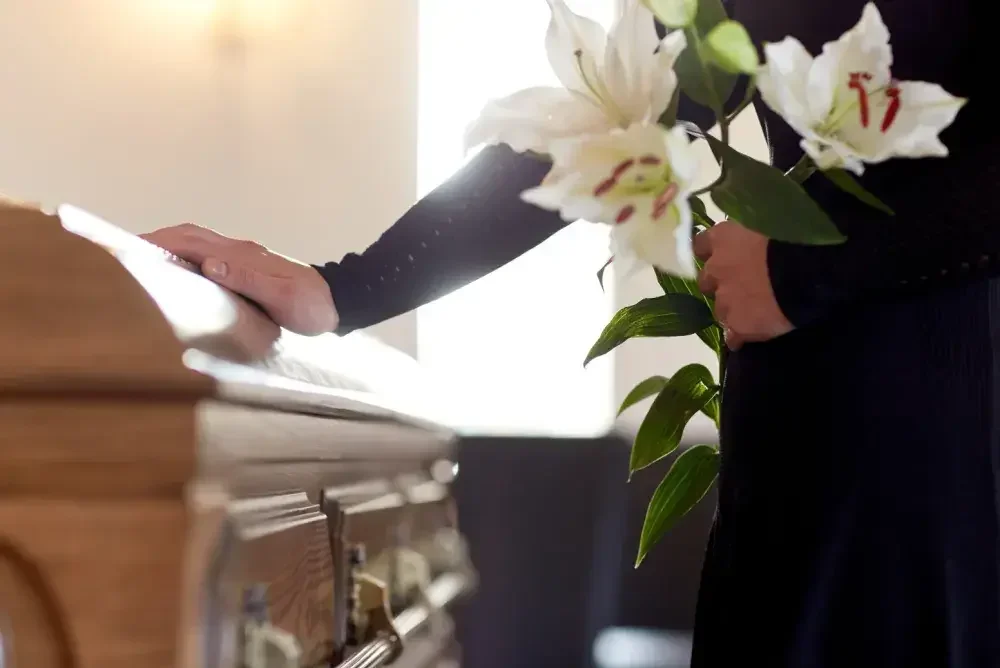The death of a cherished loved one can feel impossible to cope with. Not only are you mourning a considerable loss, but there are often many responsibilities you will need to handle, such as planning a funeral and burial services, handling an estate, and closing or transferring financial accounts.

Many of these tasks will require a certified copy of your family member's death certificate before they can process your requests. After reporting the death to the local vital records office, you will be able to request a copy of your relative's death certificate. Here's more about what you can expect when navigating this often emotionally taxing process.
What is a death certificate?
A death certificate is an official legal document that serves as proof of someone else's death. They are typically prepared by funeral directors or medical examiners and often include important information about the deceased, such as how the person died.
The information contained in a death certificate
Your loved one's death certificate will contain sensitive information about their life. These details might include the decedent's:
- Full name
- Address
- Phone number
- Birthdate and location
- Social Security number
- When the death occurred
- Cause of death
- Mother's maiden name and birth location (located on the decedent's birth certificate)
- Father's name and birth location
- Veteran claim or discharge numbers, where applicable
- Spouse's name and address
- Education status
- Marital status
The medical examiner or funeral director will ensure all known and necessary information is included on the death certificate before signing. Once it has been signed, they will submit it to your local vital records office.
Why you might need a copy of a death certificate
You may find yourself in need of a copy of your loved one's death certificate as you begin to wrap up their affairs. Some of the most common reasons for requesting a death certificate or proof of death include:
- When you want to cremate or bury the deceased
- When you need to access the decedent's investment or banking accounts
- To begin distributing the decedent's assets and property as described in their last will and testament and begin putting the estate through probate
- To transfer ownership of specific types of assets, including cars or real estate
- To transfer non-probate assets directly to chosen beneficiaries, including transfer-on-death (TOD) accounts, payable-on-death (POD) accounts, life insurance policies, and retirement savings accounts
You may also need a copy of the decedent's death certificate to notify creditors and lenders so they can request payment from the estate as it moves through probate. Certain surviving family members may even be entitled to a portion of the decedent's assets. You may need to provide a copy of the death certificate if you hope to collect pension benefits, Social Security, or Medicaid.
Who has the right to a copy of a death certificate?
Every state has different laws regarding who has the right to obtain a copy of a decedent's death certificate. In most states, only immediate family members have this right. These parties include:
- Siblings
- Surviving spouse
- Children
- Parents
- Estate administrators
- Executors of the estate
- Beneficiaries described in the decedent's will
Anyone who has a direct financial interest in the decedent's estate may also be able to obtain a certified copy of the death record if they can provide supporting evidence. However, depending on your location, anyone aged 18 or older may be able to get an unofficial copy of a death certificate. These will not be marked with official county or state stamps as certified copies are. These informational copies cannot be used for any legal reasons but may be kept for personal records. Some states also allow death certificates to be released 25 or more years after the decedent's death when the death certificate becomes a matter of public record.
How to request a copy of a death certificate

The process of requesting and obtaining a certified copy of a death certificate can be intimidating. However, once you understand what to expect, you may feel more confident taking the steps you need to finish handling your loved one's estate.
First, make sure you have all the information you need to request a copy of the decedent's death certificate. Not only do you need to provide proof of the decedent's identity, but you may need to show your passport or driver's license, and your relationship to the deceased before you can request a copy of the death certificate. Once you have this information ready, visit the vital records office where the decedent lived. In some situations, you may be able to visit the funeral director or local county health department to obtain a copy.
Your request for a copy of the decedent's death certificate should be made both verbally and in writing.
When you fill out a request form, you will need to include:
- The decedent's name
- Your relationship to the decedent
- The date of their passing
- Your reason for requesting a copy of the decedent's death certificate
Information you may need to provide
Before the vital records office will issue your certified copy of a death certificate, there may be specific information you need to provide. This might include:
- Your relationship to the deceased
- The deceased’s last known address
- The deceased’s name
- The names of the decedent's parents
- Where the decedent died
- The date of the decedent's death
- A sworn statement asserting you are the administrator or executor of the decedent's estate or a close relative
Cost of a death certificate
You should be prepared to pay for a copy of the deed and death certificate. Depending on your location and the fee structure, you might spend anywhere from $5 to $30. If you need more than one copy of the decedent's death certificate, you should prepare accordingly.
If you are acting as the administrator of the decedent's estate and pay for the copies of the decedent's death certificate out of your own pocket, you can be reimbursed through the decedent's estate. It can take up to four weeks to receive your certified copy of a death certificate after ordering. This is true even if you are able to request a copy of someone's death certificate through the Vital Records Office website.
Finding your county vital records office to request death records
If the funeral home director or medical examiner cannot provide you with a certified copy of the decedent's death certificate, you should turn to the county or state vital records office where the decedent died. You can do a quick online search for "vital records office near me" or include the county name. This should quickly return the agency results you are looking for.
Alternatively, you can check the Centers for Disease Control and Prevention's Vital Records tool, click on the state where the decedent passed away, and be directed to the state vital records office and request a death certificate online.
Death certificates for U.S. citizens abroad
If your family member passed away in another country, you may need to request a certified copy of their death certificate from the foreign government or the U.S. Consulate or Embassy. The government agency will then provide you with the Consular Report of Death Abroad (CRDA) form which can be used as proof of death for handling certain responsibilities. You can request up to 20 free certified copies from the U.S. Embassy and request additional copies from the Department of State where necessary.
Death certificate FAQs
Should I use a photocopy or a certified copy?
Getting a photocopy is always a good idea for informational purposes or handling informal tasks. However, you will need a certified copy of the death certificate to handle all legal accounts, including:
- Claiming pensions or benefits
- Closing financial accounts
- Transferring accounts
- Notifying government agencies
How long will it take to get a copy of the death certificate?
It can take a maximum of four weeks to receive your certified copy of a death certificate.
How many copies of a death certificate will I need?
It is a good idea to request at least 10 certified copies of the decedent's death certificate, because you will need to provide one each time you are handling any type of legal matter.
Where can I get a death certificate?
Get a copy of the decedent’s death certificate by visiting the local vital records office where the decedent passed away.
How much will it cost to get a copy of a death certificate?
Each state sets its own costs for certified copies of a death certificate. Generally, your first certified copy could cost as much as $30, while additional copies cost less.
Who fills out the death certificate?
Whoever is in charge of the decedent's remains will typically prepare and file the death certificate. This might include:
- The funeral home
- The medical examiner
- The cremation organization
Death certificates generally must be filled out within 10 days, depending on the state in which your loved one passed away, according to National Cremation.
A will can give your family the peace of mind you deserve
Your loved one's death certificate will allow you to properly wrap up their estate and begin the probate process. While families cannot prepare the death certificate in advance, by creating a will and comprehensive estate plans, handling these necessary tasks can be made that much easier.
You can use our online living will and estate plans to write up your advanced directive, make note of your heirs and beneficiaries, and print and sign your completed documents to have a valid will in under an hour.

